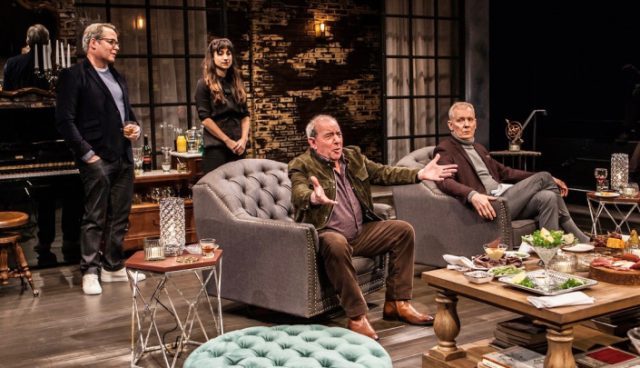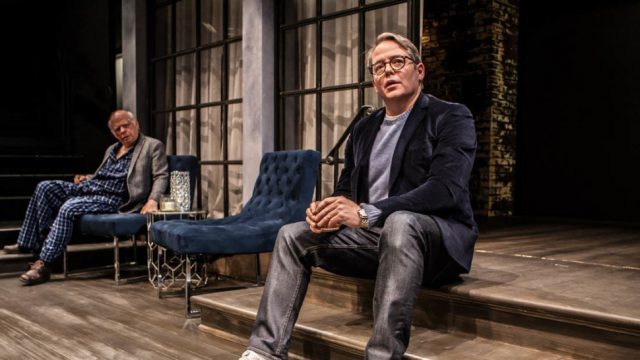
A veteran cast looks at the past, present, and future of the theater in EVENING AT THE TALK HOUSE (photo by Monique Carboni)
The New Group at the Pershing Square Signature Center
The Romulus Linney Courtyard Theatre
480 West 42nd St. between between Ninth & Tenth Aves.
Tuesday – Sunday through March 12, $100-$120
www.thenewgroup.org
“We need more plays!” Nellie (Jill Eikenberry) cries out in the New Group’s marvelous production of Evening at the Talk House, making its U.S. premiere at the Signature Center through March 12. That sentiment couldn’t be more true, especially if they’re such works as Wallace Shawn’s utterly delightful, deliciously wicked black comedy, one of the most gregarious shows you’re ever likely to see, despite its dark undertones. The audience enters the Romulus Linney Courtyard Theatre directly onto Derek McLane’s inviting set, where the all-star cast is mingling in the main meeting room of the Talk House, a club where New York’s literati partied once upon a time. The audience sits on rising rows on two sides of the stage, but before taking your seat, you can mix with the actors, enjoy gummy worms and marshmallow hors d’oeuvres, and sip colored sparkling water from plastic cups. A group of colleagues has gathered at their old hot spot, the Talk House, to celebrate the tenth anniversary of the opening night of Midnight in a Clearing with Moon and Stars, a fondly recalled critical and popular failure by playwright Robert (Matthew Broderick), now a successful TV writer. He is joined by star Tom (Larry Pine), composer Ted (John Epperson), costume designer Annette (Claudia Shear), and producer Bill (Michael Tucker), along with longtime Talk House host Nellie and server Jane (Annapurna Sriram), who regularly took great care of them ten years before. There is also an unexpected guest, Dick (director and playwright Shawn), a sad, bedraggled shell of a man who thought he should have gotten the Midnight part that ultimately went to Tom. The show begins with an extraordinary, and lengthy, monologue by Robert, making direct eye contact with nearly everyone in the audience as he fills in the details of who everyone is (and was) as well as what has become of the theater in this ostensibly realistic yet unsettling somewhat parallel universe. “At that time, you see . . . theater played a somewhat larger part in the life of our city than it does now,” he says. “A decline in the theater-going impulse could in a way be seen as a small price to pay for the rather substantial benefit derived from entering into an era that quite a few people would describe as much more tranquil and much more agreeable that the one that preceded it. . . . Because what exactly was ‘theater,’ really, when you actually thought about it?” It isn’t long before Robert discovers that this new era is not quite as tranquil and agreeable as he thought, as Shawn slyly injects some frightening twists that go by all too smoothly, highlighting how increasingly easy it is to accept monstrous horrors in our everyday life. Is this our world? Or a wryly distorted funhouse mirror of it?

Dick (Wallace Shawn) and Robert (Matthew Broderick) reminisce over old times in New Group production of Shawn play (photo by Monique Carboni)
Evening at the Talk House unfolds in a kind of near-future alternate reality where the “walls have ears.” In describing the setting of Midnight, Robert explains that it took place “in a sort of imaginary kingdom that predated history altogether or stood to one side of it, at any rate.” Although Shawn wrote Talk House several years ago, it prefigures the Trump era, as the president threatens to cut arts funding and fiercely battles a free press. “I want the old days back! Where are they? Where have they gone?” Dick, wearing pajamas, his face battered and beaten, says. “The old days were wonderful days! And they were better for me — I mean, personally, you see, they were much better for me.” There’s no room anymore for nostalgia in this world, which has changed so drastically even if not so overtly. Both the old days and the new days seem good for Shawn, who has written such previous plays as Aunt Dan and Lemon and The Designated Mourner, cowrote and costarred in Louis Malle’s My Dinner with Andre, and has memorably appeared in such films as Heaven Help Us, The Princess Bride, and Radio Days. In Evening, Shawn’s writing, acting, and direction are impeccable; the play is like a poignant short story come to life, with well-developed characters and sharply unpredictable dialogue. The acting is excellent all around, a mostly veteran cast clearly having a grand old time, glorying in their love of theater even as their characters have experienced its downfall. Audiences can rejoice as well; with shows such as Evening at the Talk House, the theater is far from a thing of the past.